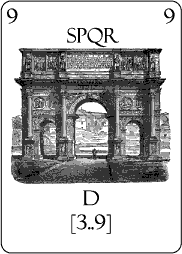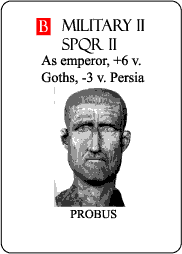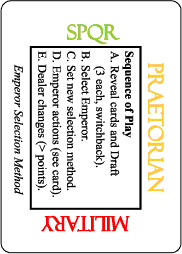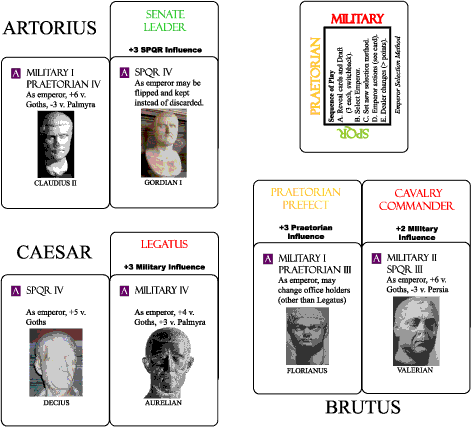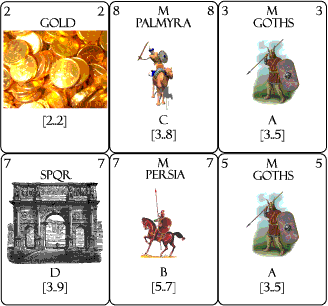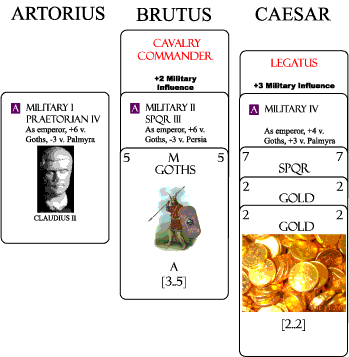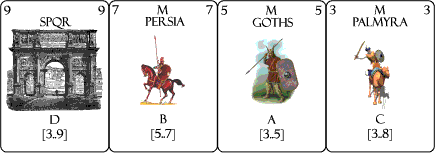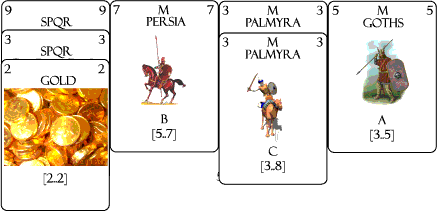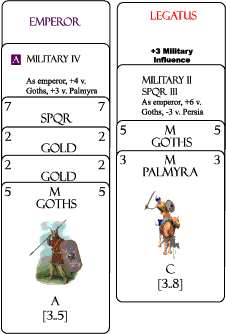In this card game for 2-4 players (best with 4) they try to gain power as often as
possible and gain as much glory as possible before succumbing to the
inevitable ...
- Reveal Cards and Draft.
Factions acquire Influence.
Note: Players are deciding whether to take cards
to try to become emperor, or to solve a crisis, or to make a
crisis more difficult for others to solve. The decision is
often not easy.
The dealer deals out face up a number of cards equal to 3
times the number of players. (If there are insufficient cards to do
so, each player removes an influence card from the hand or display
of the player to his left and places it in the middle. Repeat this until
the number of cards is sufficient. If there are more cards than
necessary, those left over after drafting are used to re-form the deck.)
Starting with the player to the left of the
dealer, in clockwise order players each take one card into hand.
Then the last player to draft a card drafts another and each player
takes one in anti-clockwise order.
Finally, the player to the left of the
dealer drafts a card and this continues in clockwise order.
No player may draft a candidate card if any other player has fewer than he
does, unless it is the player's turn to draft and candidates form the only
remaining choices.
When a candidate card is drafted, it is immediately put into play.
If the deck has become exhausted, gather up the discards and shuffle them
to form the new deck.
- Select Emperor and Legatus.
Players bid to become the next Emperor. The process may also result in
a new Legatus if this office is in play.
Note:
The more cards a player plays, the better his chance to become
emperor, but if he plays too many they may be wasted because
the new emperor dies at the end of the turn.
The orientation of the Emperor Selection card indicates how
the Emperor will be selected.
Starting with the player to the left of the dealer, each player
must put forward a single eligible candidate for Emperor, if able.
Eligible candidates must have a non-zero
rating for the current selection method.
If there are no eligible candidates, then for the current turn only,
all candidates are automatically considered eligible. If there are no
candidates at all, phases C and E are not conducted.
Once the candidates have been determined, players conduct an
auction to become Emperor.
Each candidate's starting worth is computed by adding
together his rating for the current election type, his office (if any) and
any applicable influence cards played on his card.
An office held by a candidate adds to
his starting worth, depending on the selection method being used,
as stated on the cards.
Then, beginning with the player immediately left of the player having
the highest rating so far (if there is a tie,
first such left of the dealer), players take turns
playing one or more of their hand cards to his candidate so long as
they match the current election type and the new total exceeds the worth of
every other candidate.
However, no player is permitted to play all of his cards during
this phase. Each player must save at least one.
Cards played must match the election type:
- Persians, Goths, Palmyra – contribute to Military
- SPQR – contributes to SPQR
- Gold – contributes to any
A player who cannot or will not exceed the highest rating must pass
and drops out of the election.
When all players have passed on playing cards, the candidate
having the highest total becomes Emperor.
(If there is a tie because no one played cards, the first tied player
left of the dealer is considered highest.)
All cards played on a candidate stay face up with that candidate.
- Set Selection Method.
Determine how the next Emperor will be chosen.
Note:
A player who feels he has little chance of becoming emperor
on this turn can bow out and gain the advantage of setting
the selection method on the next turn.
The first player who passed, or did not have a candidate,
in the auction for Emperor
chooses the selection method which will next be used,
which may not be the same type as the current election.
Indicate this by placing the corresponding
side of the Emperor Selection card against the deck.
- Emperor Actions.
1. Assign Offices.
Note:
Players who do not become emperor receive other offices to
give them a better chance next time.
The Emperor card is now assigned to the winning candidate.
The Legatus card is now assigned to the candidate other
than the Emperor having the best Military qualifications
(ties resolved as with the Emperor). If this candidate is holding a
different office it is automatically relinquished.
If the new Emperor or Legatus were holding offices, or if any
offices were vacant, these are now re-assigned in the order
decided by the Emperor, who must observe the following priorities:
- To the player who has an eligible candidate and the
fewest offices (Emperor is an office):
- If tied, to the player of these having the
fewest victory points.
- If still tied, to the one of these
closest to the dealer's right.
If there are multiple eligible candidates belonging to the player
chosen, the owning player decides which takes the office. If the
candidate chosen already has an office, the owner may relinquish it,
upon which it is re-assigned as above. If there are no eligible
candidates for an office, it is simply placed aside until the next
turn.
2. Crises Mount.
Factions influence crises and their perceptions.
Note:
Players must decide whether to try to make a crisis too
difficult for the opponent or to save such a card for their
own use later.
A crisis is a group of cards representing a challenge to the empire.
Crises correspond to influence cards and come in
four varieties: War with Persia, War with the Goths, War with Palmyra
and domestic crisis (SPQR cards).
The strength of a crisis is determined by adding up the numbers on all
of the cards within it.
Each player chooses a card from his hand and places it face down.
These cards are simultaneously revealed and added to the crises.
A card of a new type begins a new crisis, or if
cards of that election type are already present, they are
added to that crisis.
When Gold cards are present as
crisis cards, all of them are assigned to the crisis which is top-ranked
after all non-gold cards have been assigned.
(In case of ties, the crisis which has the tiebreaker letter
which is earlier in the alphabet has the higher rank.)
3. Emperor Addresses a Crisis.
The Emperor attempts to solve a crisis.
-
Crises are ranked for signficance. Total up the values of all of
the cards in each crisis. The one with the highest total is the top
ranked, the one with the second highest total the second ranked, etc.
(In case of ties, the crisis which has the tiebreaker letter
which is earlier in the alphabet has the higher rank.)
Hint: To make these rankings clear it helps to order them from left to right.
-
The Emperor attempts to resolve any one crisis, regardless
of his attributes.
The Emperor may play cards from the hand appropriate
to the crisis. These are cards which either match those of the crisis
type or gold. These are added to any cards already played for the
Emperor.
-
Total up the Emperor's played cards (not including the ratings on
his card) plus any applicable special ability listed on the
Emperor's card.
Discard cards from the crisis which total up to this amount.
If it's not possible to achieve the exact number, discard
the largest possible amount that is lower than the Emperor's total.
If there are different ways to add up the cards to use, the Emperor
player decides which method to use.
-
If no cards for the crisis remain, the Emperor has had a Success.
Otherwise the Emperor has had a Failure. This player receives points
as follows (this information is duplicated on the Emperor card):
Success:
| Rank of Crisis |
Points Received |
|---|
| Top | 21 |
|---|
| 2nd | 15 |
|---|
| 3rd | 10 |
|---|
| 4th | 6 |
|---|
Failure:
The Emperor player receives 1 point for each card of the
crisis that was discarded.
-
If there are any Gold cards which were formerly part of a Crisis,
but are now
unattached, they are attached to the top-ranked remaining Crisis. If
there are no remaining Crises, the cards remain in place to be
assigned on the next turn.
4. Legatus Addresses a War.
Note:
The Legatus office can earn a lot of points. A canny player
may choose to avoid becoming emperor and instead regularly
score points turn after turn by holding the Legatus (General)
office.
The player whose candidate is holding the Legatus office now addresses
any one current war (Persians, Goths or Palmyra) by
discarding one or two
cards applicable to the war. These cards can come from those played on
the Legatus or from the player's hand or both.
These are used to cancel out cards belonging to that war crisis.
If the Legatus did not remove all of the crisis cards for the war, then
the player receives 1 point for each card of the crisis that was discarded.
If the Legatus succeeded in removing all
of the crisis cards for the war, the player scores points as follows (this information is duplicated on the Legatus card):
| Rank of Crisis |
Points Received |
|---|
| 1st | 15 |
|---|
| 2nd | 10 |
|---|
| 3rd | 6 |
|---|
| 4th | 3 |
|---|
If there now any Gold cards formerly part of a Crisis, but now
unattached, they are treated as above.
Unlike an Emperor, the Legatus does not die after this activity.
5. Emperor Dies.
Emperor leaves play.
The Emperor automatically dies. If his A side was being used, the card
is flipped over and placed on the discard pile; if the B side was
in use, the card is removed from the game.
All of the influence cards that were associated with the Emperor go to the
discard pile.
- Dealer Changes.
The player with the most points becomes the last player.
Note:
Making the player with the most points the dealer helps
others to catch up.
The deck is taken up by the player having the most victory points. If
there is a tie, the deck is passed to the tied player of the current
dealer's choice other than himself.
